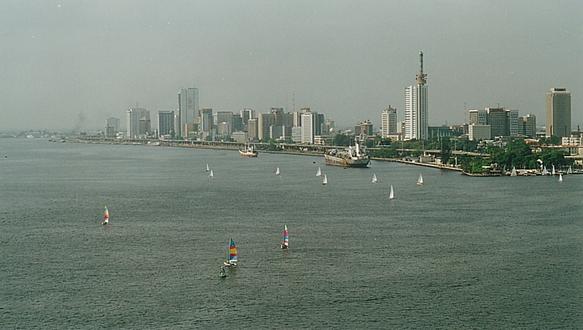Being better than Damascus, the capital of war-ravaged Syria, is not a very high bar for a global city.
But that’s the title given to Nigeria’s megacity of Lagos, with its 20 million population, according to an Economist Intelligence Unit report, which ranked it as the second-worst city in the world to live in, beside Damascus.
The report ranked 140 global cities based on criteria grouped into five main categories: stability and security; health care; culture and environment; education; and infrastructure. The Australian city of Melbourne came out as the world’s most livable city, ahead of the Austrian capital, Vienna, and Canada’s Vancouver. Both Australia and Canada had three cities each in the top 10. Hamburg in Germany; the Finnish capital, Helsinki; and Auckland, New Zealand, made up the rest.
Conversely, five of the 10 least livable cities—Douala in Cameroon; Zimbabwe’s capital, Harare; Algiers in Algeria; Libya’s Tripoli; and Lagos—were located on the African continent. Bangladesh’s capital, Dhaka; Karachi in Pakistan; and Port Moresby, capital of Papau New Guinea, were also among the worst, while Ukraine’s capital, Kiev, was the only European city in the bottom 10.
Lagos received a particularly low rank in the category of stability due to “continued threat from groups such as Boko Haram.” Kidnapping remains a significant risk, and Lagos state reported the highest number of crimes in the country in 2016.
The city also scored poorly on education and health care. As a country, Nigeria has the highest number of out-of-school children in the world, and the country also lacks an effective health care system. It has one of the highest rates of infant mortality in the world, a measure usually considered a key barometer of health care effectiveness.
But despite such factors, Lagos is not all bad.
1. Lagos Is Relatively Safe From Boko Haram
Boko Haram has wrought havoc in Nigeria since 2009, when it took up arms in a bid to establish a hard-line Islamist caliphate in the northeast of the country. But while Boko Haram has besieged many cities in Nigeria, Lagos has been largely spared from its attacks. The group claimed only a single attack in Lagos, a bombing at a fuel depot in June 2014 that killed two people.
By comparison, advanced Western cities such as London and Paris have suffered multiple large-scale militant attacks in the past three years, most of which have been claimed by the Islamic State militant group (ISIS).
2. Lagos Has a Booming Economy
While Nigeria as a whole is mired in recession amid low oil prices and reduced output, Lagos remains a beacon of economic hope in an otherwise impoverished wilderness. The state has an economy larger than most African countries, despite being one of the smallest states in the country by area. Unlike much of Nigeria, Lagos is not entirely dependent on oil: Manufacturing, transport, construction and retail are all substantial contributors to the state’s economy. Lagos also collects far more taxes than other states in Nigeria, with three times more internally generated revenue than the next state, in 2015.
3. Lagos Has a Burgeoning Tech Scene
Lagos, and in particular the district of Yaba, has become a hub for technology startups that are providing beneficial services to the city’s population. The state government has laid fiber-optic cable in the area to meet its needs, and startups are filling a range of gaps in the state’s infrastructure, from delivering blood to hospitals to tackling unemployment.
The rise of the city, dubbed Silicon Lagoon in tech circles, has not gone unnoticed by the great and good of the sector. Facebook Chief Executive Mark Zuckerberg visited Lagos in August 2016, in a ringing endorsement of the city’s tech scene, which was backed up by the Chan Zuckerberg Initiative investing $24 million in Nigerian startup Andela. Google CEO Sundar Pichai followed Zuckerberg’s lead with a surprise visit to Lagos in July, where he announced that the company planned to train 10 million African people in IT skills.
4. Infrastructure Is Bad, but It Should Get Better
One of Lagos’s biggest problems is accommodating its massive, and growing, population with decent infrastructure. Transport, in particular, poses a huge problem: Lagos consists of a series of islands connected by a handful of bridges, and with 93 percent of passengers and goods being transported by road, the roadways are often severely congested.
The Lagos state government has proposed a 13-year development plan, due for completion in 2025, that aims to revolutionize the city’s economy, infrastructure and social services to meet the needs of what it predicts will be a city population of almost 30 million. The government has also promised an urban rail system to lighten the burden on Lagos’s roads, although the first phase of this has been delayed since 2011.
5. Lagos Has a Thriving Entertainment Industry
Lagos is home to Nollywood, Nigeria’s eclectic and rapidly growing film industry. Nollywood actually produces more films per year than its better-known U.S. counterpart, Hollywood, and is a major job creator in Nigeria. It also provides hours of cheap, quirky entertainment for Nigerians and, increasingly, other African viewers. The city is also a major nightlife hot spot in Nigeria and home to some of the country’s top restaurants, and it has around a dozen white-sand beaches.
Newsweek

